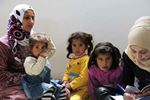Lebanon: The roots of revolution
Published on Thu, 2019-11-07 16:41
The official Lebanese VNR report of 2018 blames the Syria crisis for the economic deficits that increased the debt, as well as for economic stagnation, the doubling of unemployment and worsening poverty rates. Yet, according to the alternative civil society report by the Arab NGO Network for Development (ANND), “this exclusively negative narrative about Syrian refugees does not distinguish between the huge impact of the Syrian crisis/war on the economy and political situation in Lebanon, and the diversified impact of the presence of the Syrian refugees in Lebanon. This latter allowed financial flow of aids to increase, as well as the domestic consumption that produced around 1 -1.5 percent of GDP growth, and provided a cheap labour force that prevented the bankruptcy of many small businesses.” Thus “the Syrian crisis cannot overshadow the negative impacts of the long-implemented economic and social policies as well as the loopholes created by the lack of transparency and accountability. Focusing on rentier economies, delaying redistribution mechanisms to address inequalities, lacking a universal social protection system and with the continuous gap between the education-employment policies Lebanon has been already cultivating negative development outcomes from its policy choices”. The Lebanese VNR report has been evaluated by civil society as “a good but minor step; for it should be complemented with a systematic and holistic approach at national level, both for implementation and monitoring”. Instead, the government “adopted a sectoral approach and a fragmented methodology”. Instead of integrating the pillars of sustainable human development, it was limited to accumulating the respective Ministries’ strategies and plans. The National Committee for SDGs should have strived for integrating economic, social, environmental, political, and cultural dimensions of development into the development discourse but it “continues with a tick-box exercise of cross-reading various short-term and targeted strategies/ plans/programs and 17 SDGs. This does not reflect the required national ownership, nor does it provide a step forward to address the lack of an overarching and nationally-owned rights-based sustainable development strategy in consultation with the different stakeholders including CS0s”. By Arab NGO Network for Development. Source: Lebanese National Report 2019, Report Spotlight on Sustainable Development 2019. |


